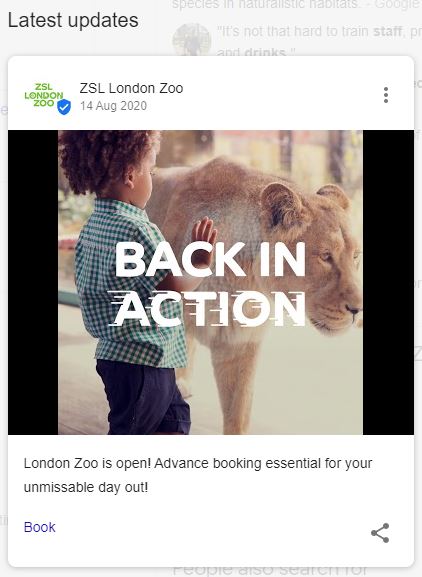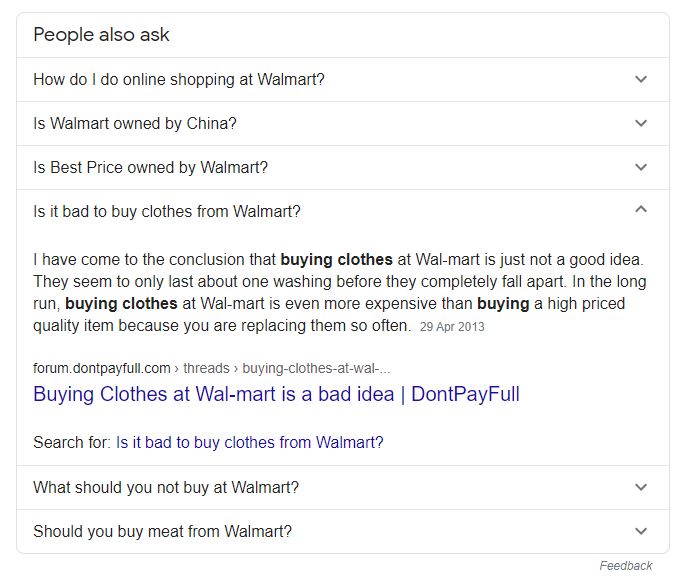SEO
Reputation Management SEO: A Beginner’s Guide

All forms of marketing play a part in good brand management.
Using the same tone of voice throughout your ads and emails, and choosing the same photo assets for your website as your billboards, contribute to the picture that is painted when a customer considers your product or service.
Sometimes, however, your brand might be in receipt of some negative press or reviews that can alter the way it is seen.
If a potential customer wants to know if your business is reputable they will likely search for you online.
Visiting your website isn’t enough and they’ll want more objective feedback.
So, online reputation management is critical.
It is the process of shaping and controlling the narrative around your brand online.
SEO is an important step to consider in that process.
Why Is Online Reputation Management Important?
Research into a brand, product, or service often begins online with a search.
Your website is likely to only be one or two of the results brought up when someone searches for your brand.
All those other search results will potentially be saying something about your brand that might not be as favorable as you would like.
For Corporate Brands
Negative reviews happen.
Unfavorable comparisons about your product and a competitor can be made by an objective third party.
Bad press can be high ranking.
If you aren’t actively monitoring what appears at the top of the search results for your branded keywords then you could be missing out on the opportunity to spot potential reputation issues.
Once a news story starts circulating about your company, or even incorrect information is added to a third party website, it can be hard to repair the damage to your brand.
It is important that your brand’s message is what’s seen on the first page of the SERPs.
Proactively working on your online reputation management can put you in a strong position to correct misinformation or outrank unfavorable content.
Our Personal Brand
This all applies to your personal brand as well as your corporate one.
You need to make sure that the information available online paints a positive picture.
We’re all getting very good at portraying ourselves positively on social media.
Photoshopping images, curating our life highlights, and only sharing information that paints us in a positive light.
Employers and recruiters are increasingly visiting social media profiles when considering candidates for a job.
But what about when someone searches your name.
What comes up on the first page of the SERPs?
How to Carry Out SEO for Online Reputation Management
I’m not going to tell you how to get your website to rank for your brand term, just that you need to.
That can be particularly tricky if your brand name is a word that means something in your or another language.
It can be especially difficult if your brand name isn’t that unique.
You do want to be ranking as close to position one as possible for your brand name, however.
This way, the first result (excluding paid results) for your brand name is a property that you control.
That said, you want positions two, three, four, and five to be properties you own, too.
1. Control the Front Page
Wherever possible the first five or so top-ranking results for your brand should be controlled by you.
Your website, any other digital properties you host, and your social media pages.
If a potential customer is looking for information on your brand you want to be maintaining the information they read.
This means taking advantage of the prominent social media sites in your region.
Set up a branded Facebook, LinkedIn, and Twitter profiles.
Social media sites are hugely authoritative and will rank highly for most branded search queries.
Don’t just settle for a social media presence though.
Set your company up with a profile on review sites, industry comparison sites.
Essentially, any property outside of your direct ownership that you can still have some say over the content of.
2. Be Active on Social Media & Review Sites
Setting yourself up on social media and review sites does come with risk.
People will comment, reviews will be left.
They will not all be favorable.
However, even if you do not have an official Twitter handle or a company created Glassdoor page doesn’t mean competitors or disgruntled employees won’t be talking about your company anyway.
You might just have less visibility of it.
Make sure you are responding to comments, positive and negative.
A negative Twitter comment might well be returned in a Google search for your brand.
Keep your company active on social media and review sites both to address any negative comments but also to keep them off the front page of Google.
3. Set up a Google My Business Listing
This is another area of the branded search results you can own.
Your Google My Business listing could well be the first result a user sees when searching for your brand.
Around festive holidays, or even during the COVID-19 restrictions, your opening hours or availability of your office might change.
Google My Business is the perfect place to keep that information updated.
If you don’t have a Google My Business listing then a search for “[your brand] opening hours” might pull information from a website that hasn’t been updated.
Google Posts
Another benefit to a Google My Business profile for reputation management is Google Posts.
Posts are small snippets of content that will appear directly on your Google My Business listing.

They allow your brand to inject timely offers, articles, or updates straight into the Google search results without having to battle the ranking algorithm or waiting for indexing.
If you are in need of some reactive PR or want to promote something quickly, this is an effective way to do that.
Reviews
A Google My Business listing does bring with it the potential for reviews of your brand to appear at the top of the SERPs.
If a user leaves a review on your Google My Business profile there is little that can be done to remove it.
It would need to contravene Google’s review guidelines in some way and even then there is no guarantee it will be ruled by Google as such.
Good reputation management is about effectively dealing with negative attention as much as positive.
A negative review can be responded to on Google My Business giving your brand the opportunity to turn a negative experience into a positive one.
Questions & Answers
Google My Business also features a Q&A section where the public can submit questions to your profile.
The main issue with this is, the public can also answer those questions.
This is a good opportunity to understand what your target audience is interested in knowing but it is a very public way to find out.
It is crucial that you stay on top of any questions asked so you can ensure the answer is accurate.
There is nothing to stop a well-meaning (or ill-intending) member of the public from answering a question and it being wrong.
Ensure you are managing your online reputation well by keeping an eye on this corner of the SERPs.
4. Create Content Around Potentially Negative Keywords
Brand searches will often yield a series of People Also Asked (PAA) search prompts.
The PAA results are a goldmine of information for your reputation management keyword analysis.
These prompts can cause searches to consider questions about the brand they may never have asked.
For instance, based in the UK, I have little exposure or understanding of the brand Walmart.
However, searching the keyword “Walmart” produces these PAAs.

Prior to seeing this PAA, I would not have known that some people may consider it a bad idea to buy clothes from the brand.
I do now.
Not only is the question “is it bad to buy clothes from Walmart?” off-putting for someone who doesn’t know much about the store, the search result it features is even worse.
Other common PAAs that will appear for brand searches include “is [brand] legit?”, “is [brand] a scam?” and “can I cancel [brand] subscription?”
Your potential customer might not have any reason to consider your brand a scam, but seeing those questions that have been searched by others may raise that concern.
Check the PAAs that appear for your brand.
If they are even slightly negative you need to ensure you are ranking as the featured snippet for them to counter that notion.
5. Be Newsworthy for the Right Reasons
If you are trying to bury a high-ranking negative news article that is grounded in fact, many will have little sympathy for you.
Instead, work on being newsworthy for the right reasons.
Gain press about your charitable giving, your encouragement of local teams, or your work to protect the environment.
Focus on digital PR for PR’s sake, even if all you get is a brand mention.
If it is on a high authority website it might be enough to outrank review sites, comparison sites, and other more dangerous properties for your brand terms.
The key is stacking the front page with positive commentary of your brand beyond the properties you have direct control over.
Set up a Brand Alert
Using Google Alerts or other brand mention monitoring tools keep an eye out for when you’re mentioned online.
It may be that a journalist, or reviewer, will be amenable to hearing your side of a negative story.
It might simply be that your company opening hours have been misreported or other inaccuracies stated.
That alert could give you the opportunity to correct misinformation or damaging accusation before it is too widely read.
6. It’s Not All About Google
Don’t forget that there are other search engines aside from Google.
Make sure you are following these steps for those search engines too.
Set up a Bing Places listing and monitor the first page of DuckDuckGo for your brand phrases.
If there is the potential for your brand to be searched in a different search engine, it is critical that you are managing your reputation there.
Author/Image Credits
All screenshots taken by author, October 2020
SEO
Google Declares It The “Gemini Era” As Revenue Grows 15%

Alphabet Inc., Google’s parent company, announced its first quarter 2024 financial results today.
While Google reported double-digit growth in key revenue areas, the focus was on its AI developments, dubbed the “Gemini era” by CEO Sundar Pichai.
The Numbers: 15% Revenue Growth, Operating Margins Expand
Alphabet reported Q1 revenues of $80.5 billion, a 15% increase year-over-year, exceeding Wall Street’s projections.
Net income was $23.7 billion, with diluted earnings per share of $1.89. Operating margins expanded to 32%, up from 25% in the prior year.
Ruth Porat, Alphabet’s President and CFO, stated:
“Our strong financial results reflect revenue strength across the company and ongoing efforts to durably reengineer our cost base.”
Google’s core advertising units, such as Search and YouTube, drove growth. Google advertising revenues hit $61.7 billion for the quarter.
The Cloud division also maintained momentum, with revenues of $9.6 billion, up 28% year-over-year.
Pichai highlighted that YouTube and Cloud are expected to exit 2024 at a combined $100 billion annual revenue run rate.
Generative AI Integration in Search
Google experimented with AI-powered features in Search Labs before recently introducing AI overviews into the main search results page.
Regarding the gradual rollout, Pichai states:
“We are being measured in how we do this, focusing on areas where gen AI can improve the Search experience, while also prioritizing traffic to websites and merchants.”
Pichai reports that Google’s generative AI features have answered over a billion queries already:
“We’ve already served billions of queries with our generative AI features. It’s enabling people to access new information, to ask questions in new ways, and to ask more complex questions.”
Google reports increased Search usage and user satisfaction among those interacting with the new AI overview results.
The company also highlighted its “Circle to Search” feature on Android, which allows users to circle objects on their screen or in videos to get instant AI-powered answers via Google Lens.
Reorganizing For The “Gemini Era”
As part of the AI roadmap, Alphabet is consolidating all teams building AI models under the Google DeepMind umbrella.
Pichai revealed that, through hardware and software improvements, the company has reduced machine costs associated with its generative AI search results by 80% over the past year.
He states:
“Our data centers are some of the most high-performing, secure, reliable and efficient in the world. We’ve developed new AI models and algorithms that are more than one hundred times more efficient than they were 18 months ago.
How Will Google Make Money With AI?
Alphabet sees opportunities to monetize AI through its advertising products, Cloud offerings, and subscription services.
Google is integrating Gemini into ad products like Performance Max. The company’s Cloud division is bringing “the best of Google AI” to enterprise customers worldwide.
Google One, the company’s subscription service, surpassed 100 million paid subscribers in Q1 and introduced a new premium plan featuring advanced generative AI capabilities powered by Gemini models.
Future Outlook
Pichai outlined six key advantages positioning Alphabet to lead the “next wave of AI innovation”:
- Research leadership in AI breakthroughs like the multimodal Gemini model
- Robust AI infrastructure and custom TPU chips
- Integrating generative AI into Search to enhance the user experience
- A global product footprint reaching billions
- Streamlined teams and improved execution velocity
- Multiple revenue streams to monetize AI through advertising and cloud
With upcoming events like Google I/O and Google Marketing Live, the company is expected to share further updates on its AI initiatives and product roadmap.
Featured Image: Sergei Elagin/Shutterstock
SEO
brightonSEO Live Blog

Hello everyone. It’s April again, so I’m back in Brighton for another two days of Being the introvert I am, my idea of fun isn’t hanging around our booth all day explaining we’ve run out of t-shirts (seriously, you need to be fast if you want swag!). So I decided to do something useful and live-blog the event instead.
Follow below for talk takeaways and (very) mildly humorous commentary. sun, sea, and SEO!
SEO
Google Further Postpones Third-Party Cookie Deprecation In Chrome

Google has again delayed its plan to phase out third-party cookies in the Chrome web browser. The latest postponement comes after ongoing challenges in reconciling feedback from industry stakeholders and regulators.
The announcement was made in Google and the UK’s Competition and Markets Authority (CMA) joint quarterly report on the Privacy Sandbox initiative, scheduled for release on April 26.
Chrome’s Third-Party Cookie Phaseout Pushed To 2025
Google states it “will not complete third-party cookie deprecation during the second half of Q4” this year as planned.
Instead, the tech giant aims to begin deprecating third-party cookies in Chrome “starting early next year,” assuming an agreement can be reached with the CMA and the UK’s Information Commissioner’s Office (ICO).
The statement reads:
“We recognize that there are ongoing challenges related to reconciling divergent feedback from the industry, regulators and developers, and will continue to engage closely with the entire ecosystem. It’s also critical that the CMA has sufficient time to review all evidence, including results from industry tests, which the CMA has asked market participants to provide by the end of June.”
Continued Engagement With Regulators
Google reiterated its commitment to “engaging closely with the CMA and ICO” throughout the process and hopes to conclude discussions this year.
This marks the third delay to Google’s plan to deprecate third-party cookies, initially aiming for a Q3 2023 phaseout before pushing it back to late 2024.
The postponements reflect the challenges in transitioning away from cross-site user tracking while balancing privacy and advertiser interests.
Transition Period & Impact
In January, Chrome began restricting third-party cookie access for 1% of users globally. This percentage was expected to gradually increase until 100% of users were covered by Q3 2024.
However, the latest delay gives websites and services more time to migrate away from third-party cookie dependencies through Google’s limited “deprecation trials” program.
The trials offer temporary cookie access extensions until December 27, 2024, for non-advertising use cases that can demonstrate direct user impact and functional breakage.
While easing the transition, the trials have strict eligibility rules. Advertising-related services are ineligible, and origins matching known ad-related domains are rejected.
Google states the program aims to address functional issues rather than relieve general data collection inconveniences.
Publisher & Advertiser Implications
The repeated delays highlight the potential disruption for digital publishers and advertisers relying on third-party cookie tracking.
Industry groups have raised concerns that restricting cross-site tracking could push websites toward more opaque privacy-invasive practices.
However, privacy advocates view the phaseout as crucial in preventing covert user profiling across the web.
With the latest postponement, all parties have more time to prepare for the eventual loss of third-party cookies and adopt Google’s proposed Privacy Sandbox APIs as replacements.
Featured Image: Novikov Aleksey/Shutterstock
-
SEARCHENGINES6 days ago
Daily Search Forum Recap: April 19, 2024
-

 WORDPRESS7 days ago
WORDPRESS7 days agoHow to Make $5000 of Passive Income Every Month in WordPress
-

 WORDPRESS6 days ago
WORDPRESS6 days ago13 Best HubSpot Alternatives for 2024 (Free + Paid)
-

 MARKETING6 days ago
MARKETING6 days agoBattling for Attention in the 2024 Election Year Media Frenzy
-

 WORDPRESS6 days ago
WORDPRESS6 days ago7 Best WooCommerce Points and Rewards Plugins (Free & Paid)
-

 AFFILIATE MARKETING7 days ago
AFFILIATE MARKETING7 days agoAI Will Transform the Workplace. Here’s How HR Can Prepare for It.
-

 MARKETING5 days ago
MARKETING5 days agoAdvertising in local markets: A playbook for success
-

 SEO6 days ago
SEO6 days agoGoogle Answers Whether Having Two Sites Affects Rankings















